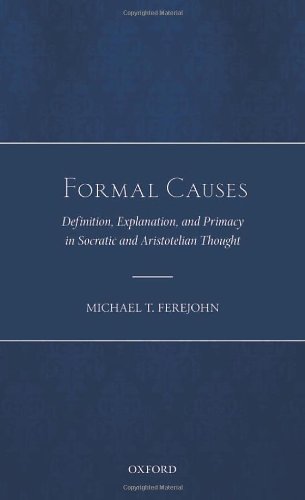(Ebook) Formal Causes: Definition, Explanation, and Primacy in Socratic and Aristotelian Thought by Michael T. Ferejohn ISBN 9780199695300, 019969530X
Michael T. Ferejohn presents an original interpretation of key themes in Aristotle's classic works. The principal historical thesis of this work is that Aristotle's commendation of the historical Socrates for "being the first to pursue universal definitions" is explainable in part by his own attraction to the "formal cause" (or definition-based) mode of explanation as providing justification for scientific knowledge. After exploring the motives behind Socrates' search for definitions of the ethical virtues, Ferejohn argues that Aristotle's commitment to the centrality of formal cause explanation in the theory of demonstration he advances in the
Posterior Analytics is at odds with his independent recognition that natural phenomena are best explained by reference to efficient causes. Ferejohn then argues that this tension is ultimately resolved in Aristotle's later scientific works, when he abandons this commitment and instead evinces a marked preference for explanation of natural phenomena in terms of efficient as well as so-called final (teleological) causes.
This tension between formal and efficient cause explanations is especially evident in Aristotle's discussions of events such as thunder and eclipses in
Posterior Analytics B 8-10. In the later chapters of the book Ferejohn defends a novel interpretation of Aristotle's manner of treating these phenomena that depends on his fourfold classification of scientific questions and the presupposition relations he believes to hold among them. The final chapter turns to the role of definition in Aristotle's mature ontology. Ferejohn argues that in
Metaphysics Z 17 he proposes a treatment of kinds of composite substances parallel to that of thunder and eclipses in the
Posterior Analytics, and that this treatment is a crucial element in his sustained argument in
Metaphysics Z and
H that such kinds are definable unities.
*Free conversion of into popular formats such as PDF, DOCX, DOC, AZW, EPUB, and MOBI after payment.


